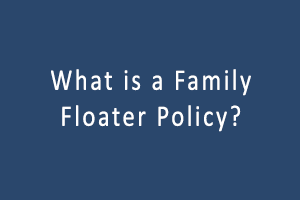A family floater policy is a type of health insurance that covers the entire family for a single annual fee. Sum Assured covers the entire family and can be utilized in the event of a large hospitalization.
Types of family floater policies:
Medical Insurance: This plan compensates you for the cost of your hospitalization. The policy specifies a list of diseases as well as the processes that must be followed. The most common method of reimbursement is through a non-refundable medical treatment.
Critical Illness: This policy pays a lump sum amount to the policyholder if you are diagnosed with a serious illness.
What do I need to know about family floater insurance?
- When the age of the covered members is reduced, the family floater becomes less expensive. Floater policy premium is based on the age of the family member. As a result, there is a significant premium for covering senior individuals in the program.
- The policy can be renewed until any member of the policy reaches the age of retirement. Most insurance companies consider this to be 60 or 65 years old. The floater policy expires when someone in the family reaches that age.
- Children under the age of one are covered under the coverage. They are recognized as adults once they reach that age and must obtain their own health insurance policy.
But why should you purchase a floater health insurance policy for your family?
A family floater plan is the most cost-effective approach to obtain health insurance for the entire family. It unites all family members under a single policy. Companies are developing new types of family floater policies in order to give diverse health insurance plans to the family. The majority of floater insurance have lower premiums than individual policies. The youngster is also included in the family floater in such circumstances. The main advantage of a family floater is that the sum secured can be distributed. Even if one of the members is admitted to the hospital and uses a portion of the sum covered, the remainder is available to all members as needed. Some family floater insurance includes dual assured options, which implies that everyone has a sum assured and the floating sum assured is available to the entire family. Section 80D also applies to family floater premiums, but only if the premium is paid for the self, spouse, children, and parents. If everyone in the joint household pays the premium, a portion of the premium will be refused as a deduction.
What is the right way to receive the best family floater cover?
Here are some pointers to help you find the ideal family floater plan for your needs:
- Check the policy’s coverage to see if it covers pre-and post-hospitalization fees, daycare expenses, and maternity costs. Make it evident if an add-on is required.
- When a family member reaches a certain age, the family floater ceases. (between the ages of 60 and 65) Because some companies offer lifetime renewals, it’s best to avoid them.
- It is preferable to obtain a quantity insured sufficiently to cover the demands of the entire family. It’s also a good idea to define the procedure for increasing the insurance limit.
- Many businesses provide cashless payment options. Obtaining a list of network hospitals will ensure that no problems arise in the future.
The benefits of family floaters are numerous. They’re designed for families who seek comprehensive coverage at a reasonable price. This is crucial to avoid uncertainty, whether the final investment is made in family health insurance or floater cover. Health insurance is a blessing and a necessity for family budgeting.
Get certification for your knowledge in the fundamentals of Computer functioning by clearing the Computer Certification Exam conducted by StudySection. After going through this Computer Certification exam, you will be able to evaluate your basic knowledge of computers.




